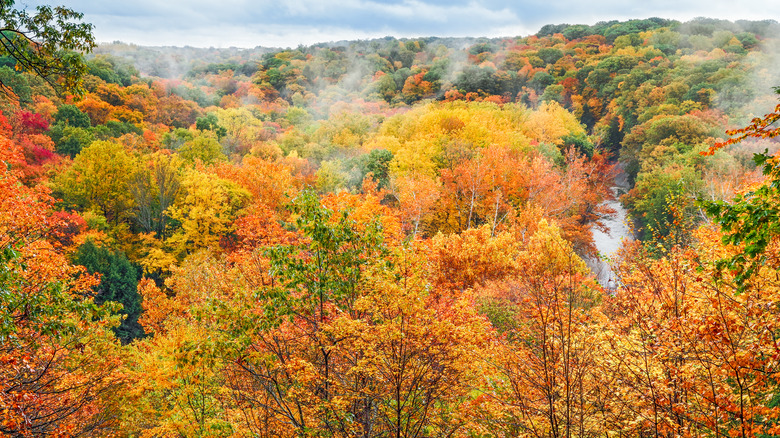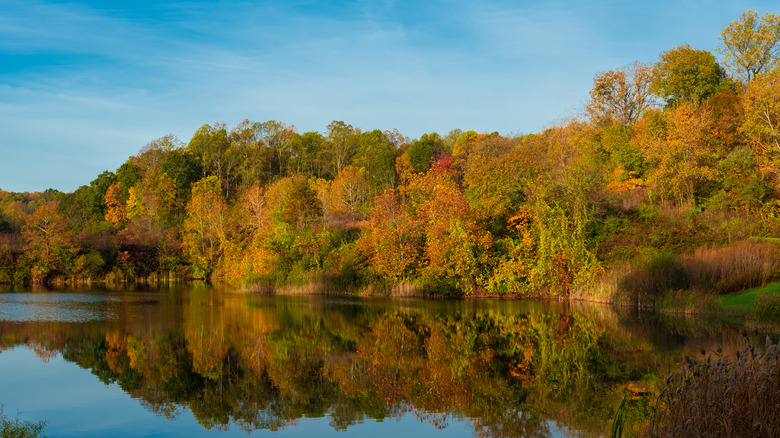Travel Guides Outdoor Adventures
Kylie McCreary
Every season offers something new and beautiful, but there’s nothing quite like the charm of fall. The green leaves of summer transform into bold hues of red, orange, and yellow. The scorching heat cools into cozy, brisk days. It’s one of the most beautiful times of the year for nature lovers to grab their gear and head into the great outdoors. If you’re looking for a spot in the Midwest to take it all in, Cuyahoga Valley National Park is the perfect place to do so.
Ohio’s only national park, Cuyahoga Valley National Park is made up of over 50 square miles sitting between Cleveland, OH, and Akron, OH. The grounds are covered by a deciduous forest consisting of maple, sassafras, and white ash trees, making it a prime location for autumnal scenery. While locals are well aware of this gem, Cuyahoga Valley is one of the lesser-known national parks that’s perfect for fall foliage views. Not only is it a spectacular place to visit for the sights and outdoor activities, but it’s arguably also one of the most important historical sites to visit in America.
The historical significance of Cuyahoga Valley National Park

Bettmann/ Getty Images
Cuyahoga Valley National Park is named after the Cuyahoga River, which flows through its valley. Local Native Americans referred to the body of water as “Ka-ih-ogh-ha,” meaning “crooked.” Stretching 100 miles with dramatic twists and turns, the Cuyahoga River is indeed crooked. Only 22 miles of this vast river are within the boundaries of Cuyahoga Valley National Park. While the river is now pristine and clean, this was not always the case.
Back in the 1800s, American settlers were busy developing Cleveland to become a national leader in industrial production. However, the environment suffered greatly as a result. The river was filled with sewage, debris, and, most notably, oil. The Cuyahoga River caught fire nearly ten times before the government intervened in 1969.
The severity of the fires led to the implementation of various crucial nationwide environmental acts, such as the Water Quality Improvement Act of 1970, the Clean Water Act of 1972, the Great Lakes Water Quality Agreement, and the establishment of state and federal Environmental Protection Agencies. Therefore, while we appreciate the modern environment of Cuyahoga Valley National Park, we can also largely attribute the preservation of the country’s beloved natural land to it.
What to do while visiting Cuyahoga Valley National Park in the fall

Kenneth Keifer/Shutterstock
The Cuyahoga Valley National Park is far from the eyesore it was back in the day. With its breathtaking landscape and a handful of family-friendly activities, it’s the perfect fall destination. From lookouts along the Brandywine Gorge Trail, Ledges Trails, Oak Hill Trail, and more, you can take in some epic views overlooking the valley’s rich, colorful foliage.
Taking a car through the park is another wonderful way to observe the autumn-painted scenery. However, perhaps the coolest option is to hop on The National Park Scenic Excursion, a two-hour train ride that weaves through the idyllic forest reserve. If you plan to visit, keep in mind that mid-October is considered the peak of the fall season.
Around this time, you can further celebrate fall by visiting one of the many farms located in the Cuyahoga Valley National Park. There, you’ll find fun activities like the corn mazes at Szalay’s Farm or the Pumpkin Pandemonium at Heritage Farms. If you’re looking for a fall wonderland to explore, Cuyahoga Valley National Park is exactly that.

